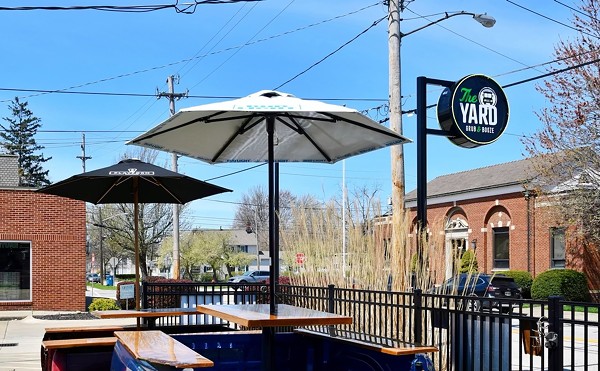There will come a time when America's lovefest with the ACLU will end, or at least taper off. Freda Levenson knows this.
The Trump administration and its attendant policies and rhetoric put the legendary civil rights organization in the spotlight, especially after it battled the president's Muslim Ban.
"The ACLU has brought some of the foundational Constitutional cases, we have a long history, but we're not your grandmother's ACLU," says Levenson, the legal director of ACLU Ohio, in her office one June afternoon. "We're as fresh and relevant as ever, and we can partly thank President Trump for that. When he was campaigning, the rhetoric was so laughable and not credible, but the ACLU took his promises seriously and we were prepared for legal challenges. So when he made good on promises to cut back rights, the ACLU was ready."
In one weekend following their first victory over Trump's Muslim Ban, the ACLU received $24 million in online donations from more than 350,000 individuals. "Our membership swelled," Levenson says, "and people that maybe hadn't noticed the ACLU were calling us heroes."
That has been great, in exposure and pure monetary terms. The donations allowed for additional hiring, but the ACLU has only about 300 staff attorneys nationwide compared to some 19,000 government lawyers — "We're still David to Trump's Goliath," she says — but it's untenable. Folks who pledged support who might think the ACLU exists to fight Trump might not like it when that portion of their work doesn't continue to populate headlines, or if and when the ACLU represents someone they disagree with.
"It's not going to last forever," Levenson says. "And we're very proud of the work we do that's also the opposite of taking on Trump." They represented Citizens for Trump during the RNC, for instance. Levenson also cites the famous 1970s case when the ACLU represented neo-Nazis and their right to march in Illinois.
As ethics and morals become fungible and flexible based on partisanship, strange bedfellows is a useful test to see if a person or organization hews to the straight and narrow points of their mission. The ACLU passes with flying colors. "We're an equal opportunity pain in the butt," Levenson says. "We're staunchly nonpartisan. We represent people that we or you may disagree with, but it doesn't matter if their Constitutional rights are being violated. Free speech protects all speech, including hate speech, and our Constitution is designed in a way that if you disagree with something or find it offensive, the solution isn't to censor it, because then it goes underground. The solution is more speech."
Levenson calls the ACLU gig the "dessert of her career." She grew up in Shaker Heights, went to Wellesley, then to the University of Michigan for law school. She landed a job as a commercial litigator and eventually became partner at a large Chicago law firm when her professional status was a rarity.
"I was the second woman at a very large firm," she says. "A lot of people didn't understand that I was a lawyer. If I showed up to a meeting, someone would ask me to get them coffee. If I came to court, the judge would say, 'Miss, when's your boss getting here?' The lawyer's lounge at the firm, to get there, you had to go through the men's bathroom. If I wanted to go to a lounge, I had to go through the women's room to the secretary's lounge. It was a novel experience; times were changing rapidly. It was great training."
After moving back to Northeast Ohio, and as her four children grew older, Levenson taught as an adjunct professor at Case Western Reserve University and started volunteering with the ACLU. It wasn't long before she was hired as a senior staff attorney, then managing attorney, then legal director. While she praises her experience as a commercial litigator, it wasn't "as satisfying as combining your passion with your intellectual pursuit," she beams.
And while the ACLU continues to fight Trumpian battles, exceptionally important work is being done on the local level every single day, just like it's always been. In Ohio, Levenson and the ACLU fought a vital battle against the state for purging Ohio's voter roles. A 6th Circuit Court ruling sided with them, allowing the votes of some 7,500 Ohioans who otherwise wouldn't have had their votes counted in the November election, through an emergency temporary action. Which isn't the end of the battle: the Supreme Court will hear the case later this year.
"I'm living my dream," she says. "It's such a gift to work with your passion and always be on the right side." — Vince Grzegorek










